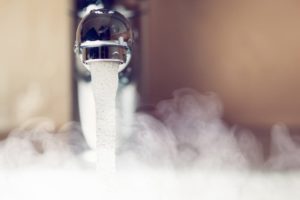
Electricity and gas are some of the most popular energy sources for residential water heating in the United States. Each energy source has its pros and cons, as well as standout features. Analyze your home and needs to help you choose the best energy source. Below are the major areas in which gas and electric water heaters differ.
Hot Water Availability
A water heater’s recovery rate is the time it takes to heat water once you deplete the available hot water. For example, a one-hour recovery rate means a heater requires an hour to deliver hot water once you use the available water. Gas water heaters have much shorter recovery times than electric water heaters.
A related parameter is the first-hour rating (FHR), which measures how much hot water the appliance can produce within the first hour of use. Again, gas water heaters have higher FHR than electric water heaters. The difference may be significant if you need a lot of hot water every morning. Adding a tank booster is a great inexpensive way to get more out of your existing water heater.
One advantage of tankless is that it will never run out of hot water so it does not have a first hour rating. A common misconception about tankless is that it’s instant hot water. For instant hot water a recirculation system is required which is an option for tankless units but without a recirculation pump it is endless hot water and it may take time to get to the fixture being used.
Cost of Ownership
The cost to own a water heater depends on multiple factors, which may vary depending on the energy source. Below are the top factors that you should consider.
Initial Cost
The initial cost of an electric water heater is more or less the same if you already have electricity and gas in your home. However, you need significant investment to switch from electric to gas heating if you don’t have a gas supply. In such a case, you must run a gas line to the house and create the necessary vents, which increases the total cost of installation.
The initial cost of converting to or installing a tankless is considerably more than a tank so it’s important to do your research and make sure that what your buying fits your needs. For instance, a large family may choose to upgrade to tankless so there will be no wait time between showers. There are many options available to fit your needs. Just like a gas tank it will require a gas supply, intake, and venting as well.
Energy Cost
Although energy prices fluctuate, gas is usually cheaper than electricity. Over time, the difference in energy costs makes electric appliances more expensive to run than gas heaters. Specific energy costs depend on each model’s efficiency, size, maintenance, and hot water usage, among other factors. An advantage to tankless is that it only heats the water when you need it unlike a tank which is always keeping the water hot weather it is being used or not. This leads to savings over time.
Maintenance Cost
Gas water heaters require more maintenance than electric water heaters. The difference comes from the combustion system, which handles higher temperatures and can leak dangerous gases if compromised. The gas lines also require regular inspections to check for leaks. Lastly, gas water heaters also feature exhaust systems, which also require maintenance.
Tankless units come with a very good warranty but also require maintenance. It is recommended by the manufactures that they be descaled annually for optimum performance. Most units come with bypass valves to make this easier.
Risks
Both gas and electric water heaters require proper maintenance to be safe. However, damages or malfunctions for each system trigger different risks. Below are some risks for gas water heaters and tankless units:
- Carbon monoxide and carbon dioxide exposure in case of poor combustion or vent damage
- Gas explosions in case of gas leaks
Electric water heaters, on the other hand:
- Electrical fire in case of electrical malfunction
- Electrocution in case of electrical malfunction or mishandling
All systems are relatively safe with proper maintenance. Thus, you should have a technician inspect and service your water heater at least once annually, irrespective of its type. However, you can use the vastly different risks to choose your energy source depending on your concerns.
Environmental Effects
Each appliance affects the environment in different ways. For example, gas appliances burn hydrocarbons and release different gases into the atmosphere. These gases pollute the environment and contribute to global warming.
The environmental effects of electric heating appliances are less pronounced because they don’t release exhaust gases. However, the electricity source determines just how clean the electricity is. For example, electricity from renewable resources, such as hydropower, is much cleaner than that from non-renewable sources, such as coal.
Whichever direction you take, ensure you engage a professional plumber. Spartan Plumbing Inc. has decades of experience with different makes and models of water heaters. Thus, we are in a good position to advise you on the best water heater for your home. Contact us for a quote or for advice as the first step to addressing your water heating needs.
